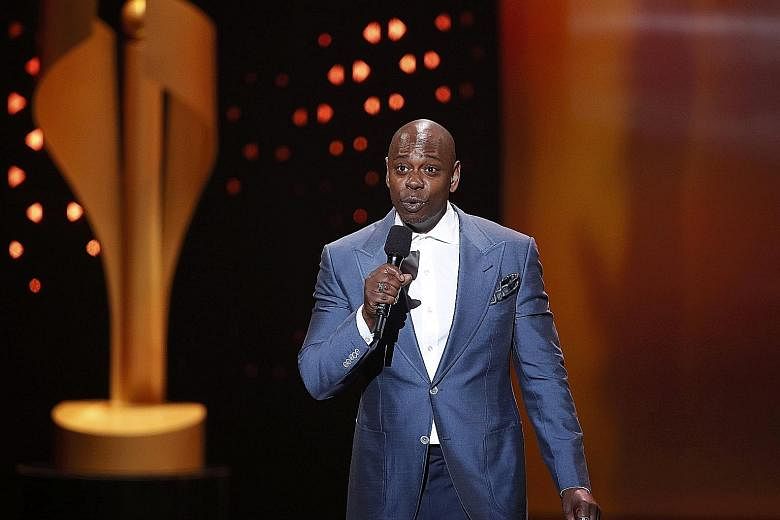NEW YORK • Whether lambasting racial inequity with his trademark eccentricity or putting on a Jheri curl wig for a now-legendary parody of Rick James, Dave Chappelle has long been considered one of the most exciting stand-ups in comedy.
But he has not issued a special or album since his infamous decision to walk away from the critically acclaimed Chappelle's Show on Comedy Central - and a US$50-million contract - in 2005.
He re-emerged in the spotlight in 2013, rekindling his love of stand-up in what one critic called "magnetically compelling" sets in a variety of spaces: comedy clubs, festivals and 10 sold-out shows at Radio City Music Hall.
Stand-up, the medium that first made Chappelle famous, was again his life's work.
Tomorrow, he releases two new specials on Netflix, Deep In The Heart Of Texas and The Age Of Spin, culled from a 2015 performance in Austin and a show last year in Los Angeles.
In a recent phone interview, Chappelle spoke about his contract with Netflix, his Saturday Night Live appearance and how the election of United States President Donald Trump affects comedy. These are edited excerpts from the interview.
You caught flak for walking away from a lucrative TV deal more than a decade ago. Now, Netflix is reportedly paying you US$60 million (S$84 million) to air these two pre-recorded stand-up performances and create a brand- new third one.
It wasn't like I made a deal and had to go out and do a lot. I just had to deliver the shows.
And you'll be releasing another brand-new special for Netflix this year as part of the threespecial deal.
Yeah. I'm working on that now.
Not a bad deal. Do you have other unreleased shows in the vault?
I have hundreds of hours of high- quality audio recording of shows I did after I quit my television show.
And then I taped three specials - one in Chicago, one in Austin and one in LA. Oh, and I also recorded the Radio City shows. These specials showcase a comedian who is reinvigorated by stand-up comedy.
I could quit my show and that's one kind of difficulty. But quitting doing stand-up would be another. I'm sure everybody gets to a point where they run out of (stuff) to say, and they've got to take a knee and recharge and be introspective and live their life. But it's hard to not ever come back to.
Guys might walk away from it and close the door, but they don't lock it behind them.
Eddie Murphy always entertains the possibility of doing it again. Even though he doesn't do it, I'm sure he thinks about it all the time. It's just one of those things where you'll do it for 10 years and then you'll think about it for the next 30.
Many of your contemporaries are still performing.
It kind of reminds me of the '90s: Chris (Rock) is back out there, I see Jerry (Seinfeld) around, I hear Jon Stewart is around again. It's fun to see everybody back. It's a good time for comedy in that respect. But the whole Trump thing makes it harder for comedians.
How so?
He's so skewed, it's hard to find an angle that sounds fresh. If you talk about him, it's almost like you're part of the chorus and not a soloist.
How do you view the dynamic between comedy and bringing truth to power?
I think it's interesting that people perceive us as having a sanctuary. Because I don't. In fact, I think we're almost disproportionately taken to task over what we say.
Chappelle's Show brought you a level of ubiquity few comedians ever achieve.
A lot of times when you're a famous dude, you don't really feel like a person is actually looking at you. They're looking at the phenomenon that you've become.
Every once in a while, a person will engage with you and you'll be like, OK, this person actually sees me.
But I didn't want the headache or the scrutiny. It was too much for me at that point. I felt like after I quit my show, the crowds could actually see me. The audience recalibrated with me. They listened to me again. And it was great.
I started playing clubs again just because I enjoyed it. It was reaffirming a love for stand-up. It was important for me to do that. I loved it.
Take me through hosting Saturday Night Live last November in the immediate wake of the election.
At a certain point (on election night), we were all in the writers' room. As the night went on and Trump was picking up these electoral (college) votes, everyone stopped writing. And then everyone was just staring at the TV. I saw people tear up sketches they were writing. They'd assumed Hillary was going to win.
Now, there was essentially no show on Saturday. It was like the wind got knocked out of the writers' room. I was worried.
And yet you delivered a humorous, poignant monologue reflecting your equal parts hope and fear for the future.
The best advice I got was from Louis C.K. I went to a comedy club Friday night (before the show) and saw him. And Louis told me: "Forget the rest of the show. The monologue is all that matters."
I was stressed out all that day. But right before I went onstage, this calm just washed over me. Everything just felt right.
NYTIMES

